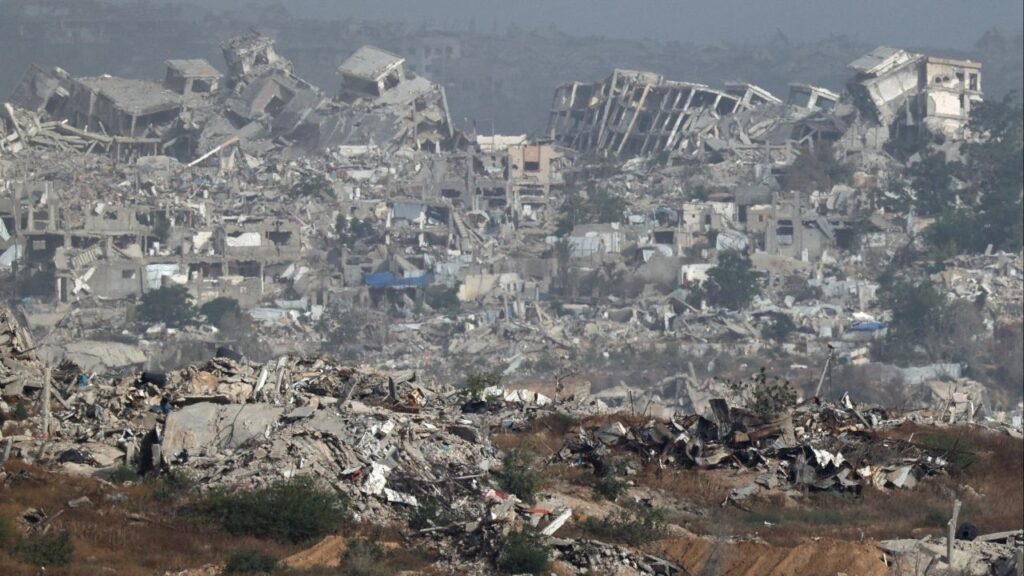Russian President Vladimir Putin listens to acting Governor of Kursk region Alexei Smirnov during a meeting via videoconference at the Novo-Ogaryovo state residence outside Moscow, Russia, Thursday, Aug. 8, 2024. (AP/Gavriil Grigorov)

- Russia's economy shows signs of slowing, with civilian industries in decline and the ruble at a two-year low.
- Inflation rises as the central bank increases interest rates to 21%, while economic growth forecasts drop sharply for 2025.
- Sanctions and wartime spending are causing strain, but the economic issues haven’t yet forced Putin to reconsider his war in Ukraine.
Share
|
Getting your Trinity Audio player ready...
|
BERLIN — The wartime economy that Russia spurred into overdrive is slowing, causing tensions among the country’s economic elites as the war with Ukraine approaches its fourth year.
Many Russian civilian industries have stopped growing, and some had even gone into decline by October, according to the latest official data. The country’s currency, the ruble, dropped to its weakest level in two years last week, and businesses say they are struggling to get new loans or to get paid by clients.
The central bank sharply raised the country’s benchmark interest rate in October to 21%, the highest since the end of the Soviet Union, in an attempt to dampen inflation.
Last month, the central bank also lowered its forecast for Russia’s economic growth next year to 0.5% to 1.5%, compared with 3.5% to 4% this year. The slowdown comes even as the government continues to pump record amounts of money into the economy to finance the war.
Related Story: White House Pressing Ukraine to Draft 18-Year-Old Men to Help Fill Manpower ...
Russia’s Economy Moving Toward Stagflation
The combination of rising prices and falling economic activity has led some economists and officials to warn that the Russian economy is moving toward stagflation, a quagmire where prices rise quickly without growth.
Western nations have subjected Russia over the past three years to some of the strictest economic sanctions in modern history to punish President Vladimir Putin for his invasion of Ukraine.
Russia’s slowing growth and rising inflation, economists say, show that the sanctions are having an impact, putting a dent in the stimulating effect that the Kremlin’s enormous wartime spending has had on the economy, they say.
Civilian companies are particularly feeling the pinch. The Russian Railways, the country’s largest employer, which transports a large share of the nation’s goods and passengers, reported its freight volume fell almost 9% in October compared with a year ago. To compensate for falling demand, the company is raising prices more than 10% in December, and trimming planned investment for 2025 by a third.
Still, the data suggest that the economic strains are still far from provoking the kind of crisis that might compel Putin to curtail his ambitions in Ukraine.
—
This article originally appeared in The New York Times.
By Anatoly Kurmanaev
c. 2024 The New York Times Company
RELATED TOPICS:
Downtown Housing Could Rise in Many California Cities, but Barriers Remain
1 hour ago
Dear Mayor and City Council, Fresno’s Housing Bottlenecks Are a Modern Form of Redlining
2 hours ago
Iran Enacts Law Suspending Cooperation With UN Nuclear Watchdog
2 hours ago
Trump Vowed to Dismantle MS-13. His Deal With Bukele Threatens That Effort.
2 hours ago
Valley Crime Stoppers’ Most Wanted Person of the Day: Logan Ryan Martin
3 hours ago
Poll: Most Americans Say National Divide, Political Violence Threaten Democracy
3 hours ago
Meta’s Instagram Down for Thousands of Users in US, Downdetector Shows
3 hours ago

From Victims to Perpetrators: Israeli Soldiers’ Nazi Comparisons and the Unfolding War Crimes in Gaza

Downtown Housing Could Rise in Many California Cities, but Barriers Remain

Dear Mayor and City Council, Fresno’s Housing Bottlenecks Are a Modern Form of Redlining

Iran Enacts Law Suspending Cooperation With UN Nuclear Watchdog













